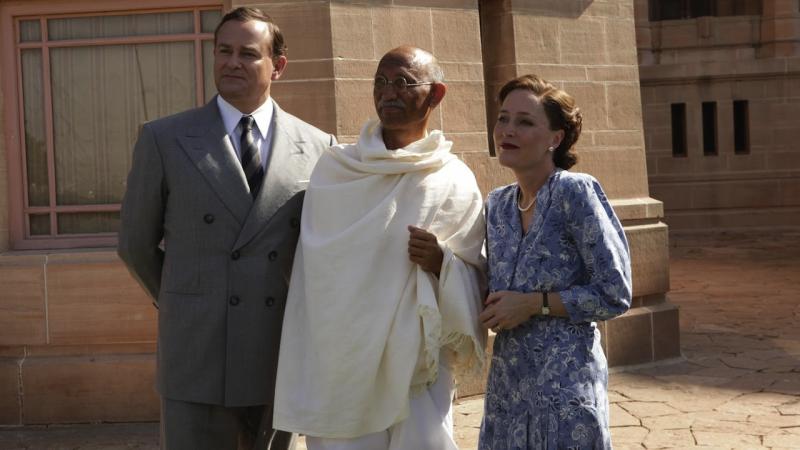While the film may or may not be historically accurate (on all counts), “Viceroy’s House,” is an extremely well-crafted, satisfying film that must be seen. Fortunately, it’s playing at the Harbor Theater right here in Boothbay Harbor.
“Viceroy’s House,” written by Paul Mayeda Berges, Moria Buffini and director Gurinder Chadha, focuses on the Partition of India on the eve of the country’s independence from Britain in 1947. Lord Mountbatten, uncle to Prince Phillip and second cousin of Queen Elizabeth II, was a decorated military man and statesman sent to India by the Labour Party to ensure a smooth and speedy transfer of power to the Indian government.
When the Mountbattens arrive in Dehli in March of ‘47 with daughter Pamela (and her adorable pupster), it doesn’t take long before they realize the great division that lies between India’s Muslim, Hindu and Sikh populations. This divide puts the notion of a united India, as Lord Mountbatten, known as “Dickie,” would prefer, in question.
Jawaharlal Nehru’s Congress Party wanted a united India; Mahatma Ghandi was of this mind as well. However, Muhammed Ali Jinnah was leading a political-religious campaign that favored creation of a new country, Pakistan (meaning “the land of the pure”) for India’s Muslim population. A year before Mountbatten arrives, India had already been rocked by the Great Calcutta Killings in which many thousands of Muslims and Hindus died. Jinnah and his followers believed their separate nation had to be created to preserve their religious and cultural beliefs. And because, as Jinnah says to Mountbatten, “Muslims do not want to be treated like the Negroes in your country.”
Even as Mountbatten is trying to keep India united, and is meeting with Nehru, Jinnah, Gen. Hastings Ismay, and Ghandi, fighting is escalating. People are dying. And Mountbatten decides the date of independence must be moved up and that India will be divided to make the western Punjab and the eastern Bengal areas of Pakistan. In the film, this decision and the creation of Pakistan were already a foregone conclusion as Jinnah and Winston Churchill had made a deal that was signed and sealed before Mountbatten arrived. A deal done to safeguard Britain’s access to oil in the Persian Gulf. This account came to director-writer Chadha’s attention from the book “Shadow of the Great Game,” written by Narendra Singh Sarila, an assistant to Lord Mountbatten in India. According to an interview with Chadha with a reporter from The Guardian, Sarila was in a London library researching his family when a librarian of Indian descent gave him a box of secret documents that were to be declassified. The documents revealed Britain’s plans to protect its interests in that part of the world post-independence.
Hugh Bonneville is the perfect Lord Louis Mountbatten and Gillian Anderson portraying Lady Edwina Mountbatten is superb - right down to Edwina’s walk, posture. Other notable performances are given by Denzil Smith as Muhammed Ali Jinnah, and Tanveer Ghani as Jawaharlal Nehru and Michael Gambon as Gen. Hastings Ismay.
Their is a Romeo and Juliet type of romance in the story between Mountbatten’s Hindu valet, Jeet (the handsome Manish Dayal), and a young Muslim woman, Aalia Noor (played by the very lovely Huma Qureeshi) assigned to Pamela Mountbatten, the couple’s 18-year-old daughter, as her translator. The two met years before when Aalia’s father was in prison a few years earlier and Jeet was employed there. Jeet remains smitten, but as Aalia has told him, she has been promised to another since birth. When Jeet finally gets Aalia to admit her feelings for him and to share the news with her father, Aalia’s betrothed arrives back from his military duty.
Actual news footage of the Mountbattens and the key players in the Partition of India is used along with specially created footage substituting Bonneville and Anderson as the Mountbattens. The sumptuous palace where the Mountbattens make their home is filled with a staff of, has to be hundreds, with Sikhs, Muslims and Hindus under its roof. As tensions mount among the political and religious leaders involved in the India’s independence and the Muslim desire for their own nation, so does tension within the last British Viceroy’s house. Fighting, heated arguments and threats flare up daily.
Edwina is highly concerned about 92 percent of India’s population being illiterate, that one in five children die before the age of five, among others. “India’s problems are social and economic not just political” she tells her husband. Lord Mountbatten tells her they will not be in India long enough to do anything about any of that. In fact, due to the “divides on religious grounds” a peaceful transition to independence was not possible leading Mountbatten to accelerated India’s transition from British rule. He did this in an effort to end the violence that was consuming the country.
Under Chadha’s sensitive direction, this film is a sensitive and compelling depiction of this tumultuous and horrific part of India, and Britain’s, history. No doubt due to Chadha’s personal connection to these events: her grandmother and grandmother’s family were forced to leave their home in the Punjab region once Pakistan was created. Chadha never got to meet one of her aunts who died as a child of starvation on the trek.
In total, 14 million people were displaced by the Partition of India and 1 million died - Muslims, Hindus and Sikhs. it is the largest displacement of people in 20th century history.
See “Viceroy’s House.” Whether you believe it to be historically accurate ... or not. The film plays at the Harbor Theater at 7 p.m. Friday, Oct. 13, Saturday, Oct. 14 and Wednesday, Oct. 18; it plays at 2 and 7 p.m. on Sunday, Oct. 15. For more information, visit https://boothbaycinema.org





























